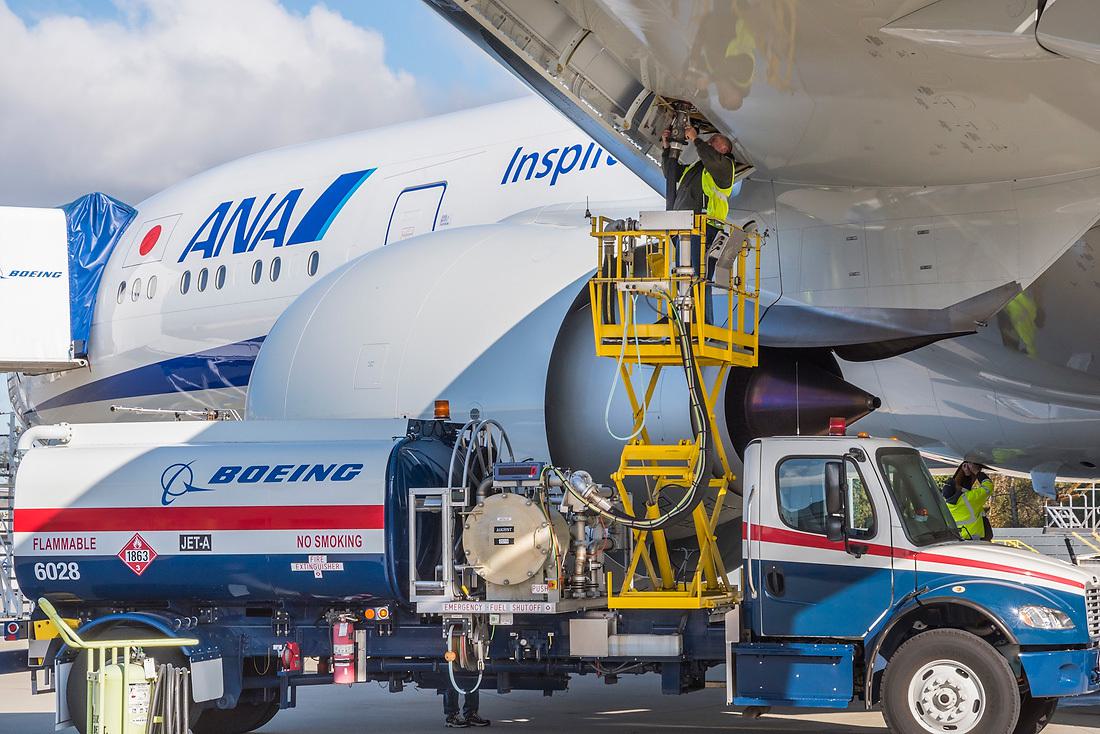LanzaTech Moves Forward on Sustainable Aviation Scale Up in the USA and Japan

Carbon recycling pioneer, LanzaTech, continues to make strides in scaling up its alcohol to jet (ATJ) platform. Commercialization of the ATJ process has been years in the making, starting with the partnership between LanzaTech and the U.S Energy Department’s Pacific Northwest National Laboratory. PNNL developed a unique catalytic process to upgrade ethanol to alcohol-to-jet synthetic paraffinic kerosene (ATJ-SPK) which LanzaTech took from the laboratory to pilot scale.
After scale up, ethanol being added as an approved feedstock in ASTM D7566 Annex A5, the Standard Specification for Aviation Turbine Fuel Containing Synthesized Hydrocarbons for alcohol-to-jet synthetic paraffinic kerosene (ATJ-SPK), and the first commercial flight with Virgin Atlantic, sustainable aviation fuel made from captured pollution is ready for full scale demonstration and commercialization.
Michael Berube, Deputy Assistant Secretary for Transportation at the United States Department of Energy, announced the DOE is in the negotiation stage with LanzaTech for a $14 million investment in a demonstration-scale integrated biorefinery at LanzaTech’s Freedom Pines site in Soperton, Georgia. The announcement was made at the Advanced Bioeconomy Leadership Conference (ABLCNext 2019) in San Francisco, California.
“LanzaTech still has some remaining work to do under the initial award, and we have some negotiations to complete. But we’re very excited about the prospects of this project and what it could mean for demonstrating the viability of drop-in biofuels in the United States,” said Berube.
This investment follows the FY2015 Project Development for Pilot and Demonstration Scale Manufacturing of Biofuels, Bioproducts, and Biopower FOA, under which LanzaTech’s proposal was selected for a feasibility study to plan and design an integrated biorefinery that will produce low-carbon jet and diesel fuels.
LanzaTech’s process can use any source of sustainable ethanol for jet fuel production, including ethanol made from recycled pollution. LanzaTech’s first commercial plant in China has produced over 10M gallons of ethanol from recycled steel mill emissions to date.
The flexibility of the technology to utilize a variety of local waste feedstocks attracted the attention of All Nippon Airways (ANA), Japan’s largest 5‑Star airline for seven consecutive years, resulting in an offtake agreement with LanzaTech signed earlier this year, allowing ANA to purchase sustainable aviation fuel from LanzaTech’s process.
Following on from this agreement, ANA, strategic investor in LanzaTech, Mitsui & Co., and JXTG Energy have been selected by the New Energy and Industrial Technology Development Organization (NEDO) – a prominent Japanese public research and development body – to conduct a feasibility study on scaling the LanzaTech ATJ platform in Japan. Together the partners will establish a sustainable domestic supply chain for ATJ, key to achieving full commercial deployment in Japan.
ANA and Mitsui & Co. kicked off the project by conducting a Boeing 777 – 300ER delivery flight using sustainable aviation fuel made from recycled carbon on October 30, 2019. As the fuel producer, LanzaTech worked closely with all partners, advising how best to transport and blend the fuel for loading on the aircraft.
“Sustainable aviation fuel reduces carbon emissions by up to 80% and is a key element of the industry’s climate action strategy,” said Sheila Remes, vice president of strategy at Boeing Commercial Airplanes. “ANA’s flight demonstrated once again that sustainable fuel blends perfectly with conventional fuel without the need for any changes to the airplane, engines or airport fueling infrastructure.”
“We are very excited to continue our efforts to establish higher standards for eco-friendly travel alongside NEDO, Mitsui & Co. and JXTG,” said Yutaka Ito, Executive Vice President of ANA. “This project closely aligns with our vision of a world where companies proactively respond to calls for environmentally-friendly leadership and this is just one of many steps ANA is taking to meet the ambitious sustainable development goals that we have set.”
“Commercial volumes of sustainable aviation fuel are desperately needed,” said LanzaTech CEO, Dr. Jennifer Holmgren. “The aviation sector is working hard to decarbonize and there are more options on the table than ever before. We are excited to play our part by accelerating scaling ATJ!”
LanzaTech’s carbon capture platform for SAF is now poised for scale up in the United States and Japan. In the UK, LanzaTech is a shortlisted applicant for a grant from the UK Department for Transport (DfT) through the Fuels for Flight and Freight Competition (F4C). This grant would support deployment of the technology in the UK, and LanzaTech has been working closely with the DfT as they assess the technology and its sustainability profile.
With 3 potential scale up projects around the world, LanzaTech is supporting global production of SAF, with associated regional job creation, enabling global access to new sustainable fuels for the aviation sector as it seeks to decarbonize.